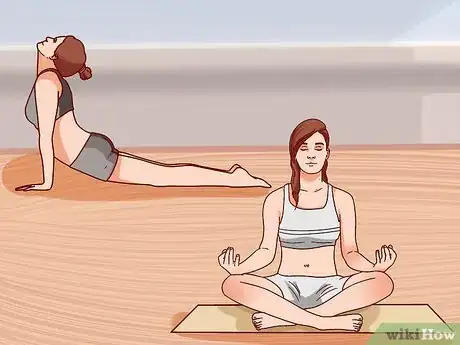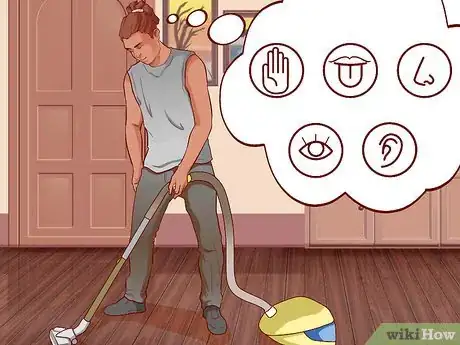This article was co-authored by Nicolette Tura, MA. Nicolette Tura is an Authentic Living Expert who operated her own wellness business for more than ten years in the San Francisco Bay Area. Nicolette is a 500-hour Registered Yoga Teacher with a Psychology & Mindfulness Major, a National Academy of Sports Medicine (NASM) certified Corrective Exercise Specialist, and is an expert in authentic living. She holds a BA in Sociology from the University of California, Berkeley and got her master's degree in Sociology from SJSU. She constantly draws from her own wounds and challenges; with her training in the healing arts and sociology, she offers potent content, powerful meditations, and game-changing seminars on inspiring elevation on a personal and corporate level.
There are 7 references cited in this article, which can be found at the bottom of the page.
This article has been viewed 112,463 times.
Enjoying strong mental health means understanding the meaning of well-being, functioning normally in everyday life, and having enough confidence to overcome the hurdles that confront you on a daily basis. In many ways, mental health is no different than physical health in that actions can be taken to promote a healthy mind. It is important to take care of your mental health from childhood through adulthood in order to avoid depression, anxiety, excessive stress, and addiction, conditions that can impact anybody. Having a peaceful mind should always be an important goal throughout life.
Steps
Building Relationships
-
1Connect with friends and family. These are the people who love and care about you and will be the most honest. Whatever emptiness you have can be filled by the friends and family who will provide you comfort and confidence. It is important to balance your life between work, fun, and family.[1]
- Talking with people you love and trust is a good way to relieve stress, think positive, and take your mind off of work and other pressing issues.[2]
- Regardless of how busy your weekly schedule is, take one day of the week to dedicate to friends and family. Your body and mind will appreciate it.
- Family and friends also provide companionship, camaraderie, and happier encounters that reduce feelings of loneliness and stress.
-
2Socialize with people who share similar interests. Communicating with people who enjoy similar activities creates a sense of belonging and promotes mental health.[3]
- Join a gym, book or card club, a sports team, or an evening walk group, to not only enjoy physical and mental exercise but also to get out of the house.
- Cultivate friendships with intelligent, educated, and experienced people. These friendships will produce stimulating conversations on a variety of topics exposing you to new ideas, perspectives, and understandings, which is a good mental exercise.
- You can locate these clubs and organizations in many places such as online, the classified section of the newspaper, or through friends and family members.
Advertisement -
3Volunteer in your community. Participating in volunteer activities has shown to increase one’s well-being, self-confidence, and self-esteem. Volunteering often benefits the community, giving you a sense of unity, accomplishment, and a positive outlook on life.[4]
- Volunteering does not have to be a major undertaking. Instead, help out an elderly neighbor get groceries, shovel the driveway in winter for a single mother, or plant a community garden to promote the health of others.
- Biologically, the side effect of making social connections through volunteering is the release of the hormone oxytocin, which is associated relaxation, trust, and psychological stability.
Enjoying Life
-
1Find a hobby. Make time throughout the week to engage in activities you enjoy doing.[5] Make it a point to relax and have fun without much stress. Hobbies, for example, are a great excuse to take a break from your busy lifestyle but still have a sense of purpose in doing them.[6]
- Studies show that a rush of excitement or joy, such as taking a walk, playing with your dog, or cooking, releases eustress, a moderate psychological stress shown to be beneficial for you.
- As a positive break from work, hobbies offer new challenges for your brain and an outlet for stress. Focusing on activities different from work gives your mind new tasks to focus on.
- The intensity of participating in something you enjoy makes time fly by. This is time you are not dwelling on the past or worrying about the future.
- Engaging in activities that you love have proven to lower blood pressure, cortisol, obesity, and body mass index while, at the same time, increasing levels of positive psychosocial states. This proves that hobbies are good for mind, body, and soul.
-
2Stay active.[7] Exercise is good for your body, but it is also good for your mental health. Many studies link increased self-esteem, concentration, and physical appearance with exercising. Exercising also improves sleep, energy levels, and social engagement while decreasing tension, stress, and mental fatigue.[8]
- No need for an expensive gym membership. Instead, take a jog in the park, a swim in the ocean, lake, or river, or stretch in the living room. There are many ways to remain active outside the gym or even at work.
- Moderate exercise – breathing heavier than normal or just breaking a sweat – for thirty minutes five times a week is recommended by most physicians.
- Choose activities that fit into your daily schedule, times that work for you, and make it a lifestyle commitment.
- If you need a partner to keep you motivated, ask a colleague, friend, or family member to join you.
-
3Eat Healthy. Eating healthy is essential for strong mental health. Not doing so will only encourage a range of possible mental health illnesses. Recent studies show that the types of food you eat will determine whether you are more prone to mental health problems or not. In short, eat a balanced diet that emphasizes lots of fruits and vegetables.[9]
- Try to eat three healthy meals every day to control your blood sugar levels. Missing meals, especially breakfast, will cause you to be hungrier, irritable, and fatigued throughout the day. Eat a healthy snack to make up for it if you have to.
- Concentrate on reducing refined foods such as sugar and increasing whole grains, fruits, and vegetables. Sugar will give you a surge of energy but ultimately will leave you tired and irritable while the sugar in fruits is absorbed slower and keeps your mood balanced.
- Protein is full of the amino acid tryptophan, which reduces anxiety and stress, regulates behavior, and improves the quality of sleep. Make sure your brain is fed a steady diet of tryptophan by including meat, fish, eggs, cheese, and nuts in your regular meal plan.
- Omega-3 and omeg-6 fatty acids found in fish oils should also find its way into your diet because they play an important role in normal brain development and function, and are known to help prevent heart attacks, strokes, and cancers.
- Drink lots of water to stay hydrated and avoid excessive alcohol to prevent dehydration. Dehydration causes irritability, loss of concentration, and reduced mental power, which is also found in the side effects of alcohol.
- Keep your diet diversified and interesting so that you can ensure you are getting the complete range of vitamins, minerals, and nutrients your body and mind need to function at a high level.
- Maintain a healthy weight to control your mood and self-esteem.
- Avoid taking drugs. Substance abuse is not a solution to solving your problems. Taking drugs only creates problems.
-
4Practice good sleeping habits. Sleeping for eight hours a day will restore your mind and body while preparing you for the next day. Without adequate sleep, your mental health will suffer, your concentration will be short, and you will be easily agitated.[10]
- Try to go to bed and wake up at the same time every day. Good habits will result in better sleeping patterns since your body will become used to the routine.
- If you do not get enough sleep, then find five or ten minutes to relax your brain by letting your mind wander, daydream, or meditate during the day.
-
5Ask for help. Do not be afraid to rely on others during stressful times. Whether that is dropping the kids off at mom’s house for a break or letting the kids sleep over at the neighbor’s house.[11]
- Always try to ask somebody you trust and can count on. This will bring you comfort and ease your mind.
- True strength and understanding comes from utilizing your resources – friends and family – when you need them. It is not a sign of weakness or failure to ask for help. Most of the time, you will discover that people enjoy helping out other people, especially if it is somebody who will really benefit from it.
- Try to be specific for the reasons you need help. People are far more understanding when they know they are helping for an important reason.
-
6Seek professional help. Cognitive behavior therapy (CBT) is a psychotherapy that focuses on problem-solving and initiating behavioral change for many different types of mental disorders. Cognitive therapy is instrumental in teaching new skills that will alter thinking and behavior for a lifetime.[12]
- CBT centers on dealing with situation thought more than on emotions.
- Therapy is open for everybody not just those with a mental disorder. In fact, at any point you would like to make a change in your life at work, home, family and friends, personal relationships or colleagues, therapy is a safe route to take.
- Cognitive therapy is also useful if you want to improve your intellect, cultural interests, learn new skills, or simply improve the overall quality of your life.
Challenging Yourself
-
1Learn a new skill. Challenge yourself to find a new skill in the office, gym, kitchen, or garage. Pick something you are interested in and try to master it. This will help you to achieve a goal, build confidence in your abilities, and improves your mental fitness.[13]
- Most jobs require some adaptation over time. Taking time to learn a new skill can keep you in control of your career path, boost your self-esteem, and keep your mind sharp.
- Lifelong learners are able to keep up with rapidly changing times and face the ever evolving challenges of modernity.
- Acquiring a new skill will help keep your mind operating at a high level, decrease the risk of cognitive impairment, and the overall enjoyment of better mental health.
-
2Deal with stress. Stress is a part of live and is unavoidable, however, understanding what triggers your stress is important in dealing with it while keeping your mental strength intact. A balanced lifestyle is the most immediate way of handling stress, but if you find stress debilitating then you might have to go a step further and reduce stress by trying yoga or breathing exercises.[14]
- Perform yoga as a way to help you experience your true nature – thoughts, feelings, and emotions – as a way to help you interact with the stressful environment. In short, it could factor in your quality of life.[15]
- Taking short, three minute breaks a few times every day to stop what you are doing and inhale and exhale deeply can help clarify your thoughts, calm you down, and make you more productive. Make sure you find a quiet space so that you can concentrate on breathing as the air circulates throughout your entire body.
-
3Live in the present moment. Take time every day to try and experience all of your senses. Performing these exercises will slow your body down and boost your brain power, reduce stress, and refocus your thoughts for the rest of the day. Our brains are constantly flooded with both visual and mental clutter as we endure the frenzied and chaotic world around us. Mindful exercises enable us to become more fully immersed in the present moment, and break the chain of stress and worry.[16]
- Mindfulness is the art of experiencing the step-by-step process of ordinary, everyday activities by consciously thinking about how each sense plays a role in doing the mundane. Breathing is a key element to this exercise as you will need to concentrate on inhaling, exhaling, and tracing the path of the air as it travels throughout your body. Mindful exercises will bring the moment-by-moment awareness of thoughts, sensations, feelings, and a sense of the environment around you.[17]
- Doing routine chores around the house can serve as mindful exercises. Whether vacuuming, ironing, or dusting, engage with each step of the process instead of performing it without thought.
- Take ten minutes every day to perform one mindful activity. Keep a journal to write down your feelings to each activity to explain in words your experience. It is important to realize the difference in performing the activity mindlessly compared to mindfully.
Expert Q&A
Did you know you can get expert answers for this article?
Unlock expert answers by supporting wikiHow
-
QuestionHow do you stay mentally strong at work?
 Lauren Urban, LCSWLauren Urban is a licensed psychotherapist in Brooklyn, New York, with over 13 years of therapy experience working with children, families, couples, and individuals. She received her Masters in Social Work from Hunter College in 2006, and specializes in working with the LGBTQIA community and with clients in recovery or considering recovery for drug and alcohol use.
Lauren Urban, LCSWLauren Urban is a licensed psychotherapist in Brooklyn, New York, with over 13 years of therapy experience working with children, families, couples, and individuals. She received her Masters in Social Work from Hunter College in 2006, and specializes in working with the LGBTQIA community and with clients in recovery or considering recovery for drug and alcohol use.
Licensed Psychotherapist It can be hard to stay focused and strong at work, especially the longer your day goes on. Your goal should be conserving energy to ensure that you're running on fumes by the time the work day is over. Take your breaks, rest your eyes for 10-15 seconds whenever you feel them getting strained, and try to get plenty of sleep before your work shifts.
It can be hard to stay focused and strong at work, especially the longer your day goes on. Your goal should be conserving energy to ensure that you're running on fumes by the time the work day is over. Take your breaks, rest your eyes for 10-15 seconds whenever you feel them getting strained, and try to get plenty of sleep before your work shifts. -
QuestionHow do I become more strong and fearless?
 Nicolette Tura, MANicolette Tura is an Authentic Living Expert who operated her own wellness business for more than ten years in the San Francisco Bay Area. Nicolette is a 500-hour Registered Yoga Teacher with a Psychology & Mindfulness Major, a National Academy of Sports Medicine (NASM) certified Corrective Exercise Specialist, and is an expert in authentic living. She holds a BA in Sociology from the University of California, Berkeley and got her master's degree in Sociology from SJSU. She constantly draws from her own wounds and challenges; with her training in the healing arts and sociology, she offers potent content, powerful meditations, and game-changing seminars on inspiring elevation on a personal and corporate level.
Nicolette Tura, MANicolette Tura is an Authentic Living Expert who operated her own wellness business for more than ten years in the San Francisco Bay Area. Nicolette is a 500-hour Registered Yoga Teacher with a Psychology & Mindfulness Major, a National Academy of Sports Medicine (NASM) certified Corrective Exercise Specialist, and is an expert in authentic living. She holds a BA in Sociology from the University of California, Berkeley and got her master's degree in Sociology from SJSU. She constantly draws from her own wounds and challenges; with her training in the healing arts and sociology, she offers potent content, powerful meditations, and game-changing seminars on inspiring elevation on a personal and corporate level.
Authentic Living Expert Try not to compare yourself to others. Love your body and surround yourself with people that you can be real with. If anyone you spend time with regularly makes you feel bad about yourself, I would really question the relationship or tell them how you feel. Make sure to spend time soaking up things that make you feel good about yourself, such as TV shows, books, and anything that makes you feel better. Really try to focus on the positive and being grateful for what you have, even when challenges come up.
Try not to compare yourself to others. Love your body and surround yourself with people that you can be real with. If anyone you spend time with regularly makes you feel bad about yourself, I would really question the relationship or tell them how you feel. Make sure to spend time soaking up things that make you feel good about yourself, such as TV shows, books, and anything that makes you feel better. Really try to focus on the positive and being grateful for what you have, even when challenges come up. -
QuestionHow do you control your emotions?
 Nicolette Tura, MANicolette Tura is an Authentic Living Expert who operated her own wellness business for more than ten years in the San Francisco Bay Area. Nicolette is a 500-hour Registered Yoga Teacher with a Psychology & Mindfulness Major, a National Academy of Sports Medicine (NASM) certified Corrective Exercise Specialist, and is an expert in authentic living. She holds a BA in Sociology from the University of California, Berkeley and got her master's degree in Sociology from SJSU. She constantly draws from her own wounds and challenges; with her training in the healing arts and sociology, she offers potent content, powerful meditations, and game-changing seminars on inspiring elevation on a personal and corporate level.
Nicolette Tura, MANicolette Tura is an Authentic Living Expert who operated her own wellness business for more than ten years in the San Francisco Bay Area. Nicolette is a 500-hour Registered Yoga Teacher with a Psychology & Mindfulness Major, a National Academy of Sports Medicine (NASM) certified Corrective Exercise Specialist, and is an expert in authentic living. She holds a BA in Sociology from the University of California, Berkeley and got her master's degree in Sociology from SJSU. She constantly draws from her own wounds and challenges; with her training in the healing arts and sociology, she offers potent content, powerful meditations, and game-changing seminars on inspiring elevation on a personal and corporate level.
Authentic Living Expert Consider starting a journal. If you are ruminating on certain emotions, journaling is a way to get more space in your mind. Try using stream of consciousness to let out everything that you are feeling, or use a prompt to help get you started. These different techniques can all help you if you struggle with faulty thinking or just need some space from your thoughts.
Consider starting a journal. If you are ruminating on certain emotions, journaling is a way to get more space in your mind. Try using stream of consciousness to let out everything that you are feeling, or use a prompt to help get you started. These different techniques can all help you if you struggle with faulty thinking or just need some space from your thoughts.
References
- ↑ https://www.nhs.uk/conditions/stress-anxiety-depression/improve-mental-wellbeing/
- ↑ Nicolette Tura, MA. Authentic Living Expert. Expert Interview. 23 January 2020.
- ↑ https://www.nhs.uk/conditions/stress-anxiety-depression/improve-mental-wellbeing/
- ↑ http://www.helpguide.org/articles/work-career/volunteering-and-its-surprising-benefits.htm
- ↑ Nicolette Tura, MA. Authentic Living Expert. Expert Interview. 23 January 2020.
- ↑ https://www.nhs.uk/conditions/stress-anxiety-depression/improve-mental-wellbeing/
- ↑ Nicolette Tura, MA. Authentic Living Expert. Expert Interview. 23 January 2020.
- ↑ Lauren Urban, LCSW. Licensed Psychotherapist. Expert Interview. 3 September 2018.
- ↑ https://www.helpguide.org/articles/mental-health/building-better-mental-health.htm
- ↑ https://www.uhs.umich.edu/tenthings
- ↑ https://www.uhs.umich.edu/tenthings
- ↑ https://beckinstitute.org/get-informed/what-is-cognitive-therapy/
- ↑ https://www.nhs.uk/conditions/stress-anxiety-depression/improve-mental-wellbeing/
- ↑ https://www.helpguide.org/articles/mental-health/building-better-mental-health.htm
- ↑ Nicolette Tura, MA. Authentic Living Expert. Expert Interview. 23 January 2020.
- ↑ https://www.nhs.uk/conditions/stress-anxiety-depression/improve-mental-wellbeing/
- ↑ Nicolette Tura, MA. Authentic Living Expert. Expert Interview. 23 January 2020.
About This Article
To stay mentally strong, make sure to regularly connect with friends and family as this will help to relieve stress and loneliness. You should also make time for activities you enjoy, such as taking a walk, playing with your dog, or cooking. Additionally, try your best to exercise regularly and eat a healthy diet, as a strong mind depends on a strong body. Also, try and take a few minutes everyday to immerse yourself in the moment by experiencing all of your senses and breaking the chain of stress and worry. For more tips from our Counselor co-author, including how to ask for help during stressful times, read on!











































































Medical Disclaimer
The content of this article is not intended to be a substitute for professional medical advice, examination, diagnosis, or treatment. You should always contact your doctor or other qualified healthcare professional before starting, changing, or stopping any kind of health treatment.
Read More...